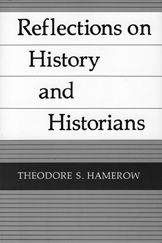The University of Wisconsin Press
History
|
Reflections on History and Historians Far from being a sentimental look at the past, Hamerow’s work confronts the unpleasant reality of the present. History, he says flatly, is a discipline in retreat. The profession is in serious trouble and there are no signs that its problems will be resolved in the foreseeable future. After identifying the current crisis, Hamerow proceeds to trace the development of the profession over the last hundred years and to examine its characteristics in modern society. In this section of the book he shares some fascinating practical observations on the ways in which the profession operates. Hamerow explains why some historians rise to prominence while others do not. He also examines causes of the dissatisfactions that afflict many historians and their students. Hamerow also examines the way in which academic historians live their lives, as he expands on the daily realities that they face. He then explains how those realities have shaped scholarship and led to the “new history.” The broad use of social science methods, he observes, has had the effect of isolating the new historians from traditional historians, indeed from one another. Couched in the arcane prose of machine-readable languages, says Hamerow, history has become inaccessible to the intelligent lay reader who had once read historical works with interest, understanding, and appreciation. In concluding his examination, Hamerow asks, “What is the use of history?” It has long been a favorite question asked by historians, but seldom one over which they agonized for very long. After considering various arguments for the usefulness of historical investigation, Hamerow offers his own justification. There are times, says Hamerow, when even the most spontaneous or instructive cultural pursuits need to be examined in the light of the purposes they serve and the goals they seek. Now might be a good time for all historians to take a long look at the direction their discipline has taken in the past century, at the functions it has come to perform, and at the serious dilemma it now faces. Hamerow is a steady and helpful guide to any such examination. Theodore S. Hamerow received his Ph.D. at Yale University in 1951 and is professor emertus at the University of Wisconsin–Madison, having taught here since 1958. He is renowned for his work on Central European history, especially of the nineteenth century. He is the author of numerous articles and is the author, co-author, of editor of eight other books, including Restoration, Revolution, Reaction: Economics and Politics in Germany in 1815–1871 (Princeton University Press, 1958), The Social Foundations of German Unification, 1858–1871 (Princeton University Press, 1969), and The Birth of a New Europe: State and Society in the Nineteenth Century (University of North Carolina Press, 1983). Media & bookseller inquiries regarding review copies, events, and interviews can be directed to the publicity department at publicity@uwpress.wisc.edu or (608) 263-0734. (If you want to examine a book for possible course use, please see our Course Books page. If you want to examine a book for possible rights licensing, please see Rights & Permissions.)
|
The 1986 cloth edition, ISBN 978-0-299-10930-1, is out of print.
|
|||||||
|
If you have trouble accessing
any page in this web site, contact our Web manager. Updated 7/31/2015 © 2012, The Board of Regents of the University of Wisconsin System |
